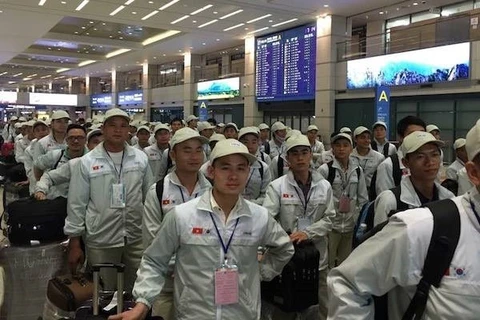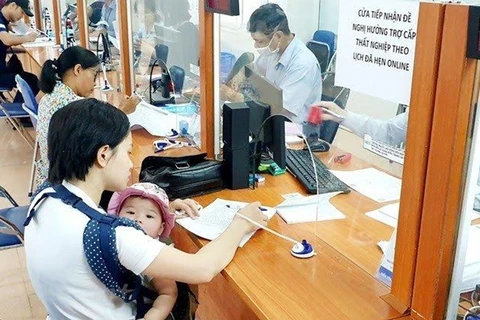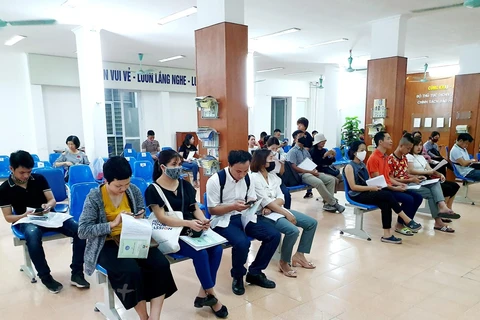 The garment-textile sector is forecast to need more workers in the fourth quarter of this year. (Photo: VietnamPlus)
The garment-textile sector is forecast to need more workers in the fourth quarter of this year. (Photo: VietnamPlus) Hanoi (VNA) – Business and production activities are expected to pick up in the last three months of a year, thus helping with the recovery of the labour market from the negative impacts of the COVID-19 pandemic. Therefore, the unemployment rate is likely to drop and labourers’ income is expected to rise in the last quarter of this year, experts said.
Recovering job market
According to the General Statistics Office (GSO), business confidence in the manufacturing and processing sector in the fourth quarter’s prospect has improved significantly, with 82.5 percent of the firms believing production will increase, 82.3 percent expecting a rise in the number of orders, and 79.6 percent hoping to get new orders for exports.
As many as 88.5 percent of the enterprises have planned to maintain or expand their workforce.
Dr. Nguyen Thi Huong, head of the GSO, said in the worst scenario when the COVID-19 returns, the outlook for production and business in the last quarter is till brighter than that in the previous six months.
Production and business activities in the last quarter of a year always become more hectic as businesses make investment and expand operation to complete signed orders and contracts, she explained.
Notably, household and individual spending also increases sharply in the final months, creating a push for production, business and investment activities, she added.
A report issued by Navigos Group, the leading company in Vietnam’s recruitment industry, unveils that new policies on bilateral and multilateral trade agreements have led to a wave of moving factories from China to Vietnam. Some textile factories and companies have registered or built new factories in Vietnam.
In addition, this industry has appeared investors who have expanded or have just entered the market in Vietnam, mainly enterprises using Chinese (Hong Kong, Taiwan, China), Japanese, and some European investors such as Germany.
Some textile and garment enterprises expand their operations such as building new factories or moving factories from other countries to Vietnam or transferring orders from abroad to Vietnam for production.
Therefore, these businesses have great recruitment demand for personnel, including middle and senior positions. This recruitment demand is forecasted to increase in the last quarter and sharply increase in the next 6 months.
As noted by Navigos Search, the energy industry is seeing a wave of investment and cooperation between European countries and domestic energy developers.
There is the participation of the US in the promotion and development of gas power projects in Vietnam. Besides, there are many large-scale projects of over 2 billion USD distributed throughout the three regions but mainly concentrated in the central and the southern localities.
Therefore, recruitment demand in the energy sector is forecast to continue to increase in the next three-six months.
In the coming time, two large Japanese enterprises in the retail sector will start operating in Hanoi, promising to increase recruitment demand in Q4 and early 2021.
Intensifying job connectivity
The GSO, however, said jobs in the informal sector account for 57.0 percent of the total, with a growth rate of 5.8 percent as compared with only 0.8 percent in the official sector.
 Job placement centres step up online interviews to boost supply-demand connectivity. (Photo: VietnamPlus)
Job placement centres step up online interviews to boost supply-demand connectivity. (Photo: VietnamPlus) The gap reflects the unsustainable recovery of the domestic labour market since workers in informal sectors find it hard to access social welfare and insurance.
Deputy Minister of Labour, Invalids and Social Affairs Le Van Thanh said during the last months of this year, his ministry will focus on measures to remove difficulties for production and business, promote the labour market, generate more jobs and raise income and living standards of labourers, for example giving priority to approving business projects that can generate a large number of jobs.
Job service centres have enhanced online transactions, proactively provided labourers for enterprises, and applied science-technology in demand-supply connectivity.
The ministry is also working on policies on helping labourers affected by the COVID-19 pandemic get vocational training, using the unemployment insurance fund, in order to help them keep their jobs or find new ones as soon as possible./.























